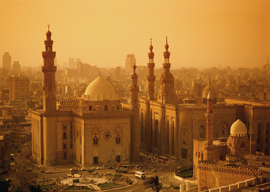
February 07, 2011

It is hard for an old hack like me to sit still when a big story is unfolding. Not so long ago, the sound of gunfire almost anywhere on Earth called me off with the rest of the pack to see who was shooting at whom. Now my colleagues are in Cairo watching history at play while I tap away at the keyboard in the lower Alps. I read their copy, listen to their radio bulletins, and watch their television reports. (How do they listen to the stupid questions from their anchors at home without laughing out loud?) I know what a hard time they are having. I don”t mean getting arrested by the Egyptian police, which is the finest tribute a corrupt regime can pay our otherwise discredited profession. What is truly hard is figuring out what is going on, even when you are there”perhaps because you are there.
In Cairo’s Tahrir (Liberation) Square, the leaderless mass expressed hundreds of different opinions to journalists. Most Egyptian demonstrators”Coptic and Muslim, poor and middle class, religious and secular, young and old, men and women”demanded an end to Hosni Mubarak’s illegitimate rule. Most detest his new vice-president, intelligence chief Omar Suleiman. Beyond that, what do they want? What is their vision for Egypt? When I read my colleagues grappling to answer those questions, I sympathize with them. There are too many voices. The people in the square and other gathering places in Cairo, Alexandria, the Nile Delta, Port Said, and the city of Suez have enunciated no long-term program. No party leadership is articulating the protestors” goals. The only common theme is rage against Mubarak and all he represents: severe repression, torture, police brutality, corruption on a scale that surpasses the worst Levantine standards, subservience to the United States, collusion with Israel to starve the Gaza Strip’s people, and the impoverishment of a nation-state whose resources were once more evenly shared.
“My view is that the US undermines its pro-democracy rhetoric with its consistent policy of preventing democracy in the dictatorships it underwrites.”
If the reporters there make mistakes, remember that you would, too. It is not easy to stand in a crowd of ten or twenty thousand human beings and decipher their intentions. Looking into a lone individual’s soul”with its complications, divided loyalties, and conflicting motives”is confusing enough. Historians a few generations after these events might succeed.
The New York Times” Anthony Shadid is doing some of the best reporting in Egypt, as he did in Iraq. He listens to people and disregards embassy propaganda, which is great for his readers if not his editors. The Economist‘s Max Rodenbeck, although deprived of a byline (customary with that august publication), is also doing great work. He knows the country well, speaks perfect Arabic, and wrote the excellent Cairo: The City Victorious. His eyewitness reports may in part have inspired the editors to write in the last edition: “If the West cannot back Egypt’s people in their quest to determine their own destiny, then its arguments for democracy and human rights elsewhere in the world stand for nothing.”